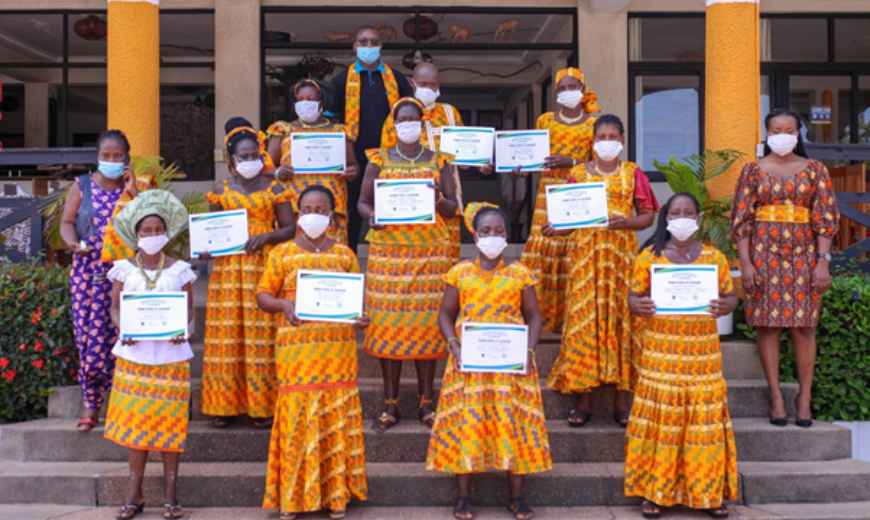Recording forthcoming
Trade Fair Live Fair (TFLF) is the ambitious project of the Fair Trade and Ethical Fashion movements across Europe to join forces to foster more resilient livelihoods for the producers and workers behind many of the products that European citizens consume.
Trade Fair Live Fair (TFLF) is the ambitious project of the Fair Trade and Ethical Fashion movements across Europe to join forces to foster more resilient livelihoods for the producers and workers behind many of the products that European citizens consume.
Trade Fair Live Fair has spent the last three years (2017-2020) researching, lobbying and campaigning on the continuing and endemic poverty many producers and workers in developing countries face, as the direct result of imbalances of power in supply chains.
The project has enabled us to do in-depth studies into the huge challenges that prevent workers and producers in developing countries from escaping poverty. It suggests practical ways forward for policymakers in government and business.Key documents and reports
- Agata Sobiech: Team Leader - Development Education and Awareness Raising (DEAR)
- David Taylor: Policy Manager, Fairtrade Foundation UK
- Sarah Ditty, Global Policy Director, Fashion Revolution
- Erinch Sahan, Chief Executive, World Fair Trade Organization
- Sergi Corbalan, Executive Director, Fair Trade Advocacy Office
The literature review, conducted as part of the TFLF Baseline study, of public attitudes towards fair and ethical trade showed a strong correlation of awareness of citizens and actual buying behaviour."In Côte d’Ivoire, with the support of Max Havelaar France we have just launched the
- Fairtrade Foundation’s Living Incomes report “Craving a Change in Chocolate” sheds light on the issue of low incomes for cocoa farmers in Côte d’Ivoire and Ghana. The report raises the priority of cocoa farmers, especially women who carry the greatest burden, to secure living incomes and fairer prices for our chocolate consumption to be sustainable.
- Fairtrade Finland’s Public Procurements Guide was launched during their Sustainable Public Procurements campaign. The Guide includes practical recommendations for officers responsible for public procurements, town councilors and MPs. Fairtrade Finland held over 300 meetings in different locations in Finland promoting Sustainable Public Procurements and greater awareness of SDG12 within towns’ strategies and policies.
- “Coffee, the success story hiding the crisis” is a report produced by the Commerce Equitable France jointly with Max Havelaar France. It highlights the imbalances in coffee supply chains in 3 countries (Colombia, Ethiopia and Peru) and highlights that Fair Trade is the alternative model to achieve greater improvements in the producers’ livelihoods due to higher prices secured (through the Fairtrade minimum price and premium) and less hidden costs.
- COP 25 position paper was produced jointly by consortium partners and members of the wider FT movement. The resource was disseminated through social media platforms and websites of the consortium members.
- Fair Trade Advocacy Office’s study Towards sustainable cocoa supply chains: regulatory options for the EU – informs the debate around a potential European Union-wide regulation for cocoa products, including chocolate, entering the EU market. It has a range of recommendations for the EU, producer countries and businesses.
- A “Transposition Guide on the Unfair Trading Practices Directive” was developed by FTAO, Traidcraft Exchange and a number of other NGOs, to provide guidance to interested parties (NGOs, businesses, policy makers and members of the public) explaining key features of the EU Directive and providing guidance on how to ensure that the transposition process results in legislation at national level that improves the minimum standard laid down by the Directive.
- A catalogue of 51 ideas about how companies can contribute to SDGs was developed by Fairtrade Denmark.
- The Consumer Survey 2020 asked +5000 consumers in five European countries about whether they had tried to purchase items produced in a sustainable way during the past year, along with their stance on how much businesses and governments should enable them to make responsible decisions.
scaling-up phase and the next cohort of the programme, co-funded by ÉQUITÉ 2, a programme financed by the French national development agency (AFD) and the French Facility for Global Environment (FFEM) to support the environmental and social sustainability of fair trade production in West Africa. Private sector donations from the Co-op UK and Compass Group UK & Ireland, and PLUS in the Netherlands, are joined by contributions from national Fairtrade organizations in Belgium and Germany.
We have also integrated some of the Women’s School of Leadership learnings into the trainings we deliver through our West Africa Cocoa Programme in Côte d’Ivoire and Ghana. This programme has supported cooperatives to develop their gender policies, and create a clear action plan to promote women’s empowerment."



No comments:
Post a Comment